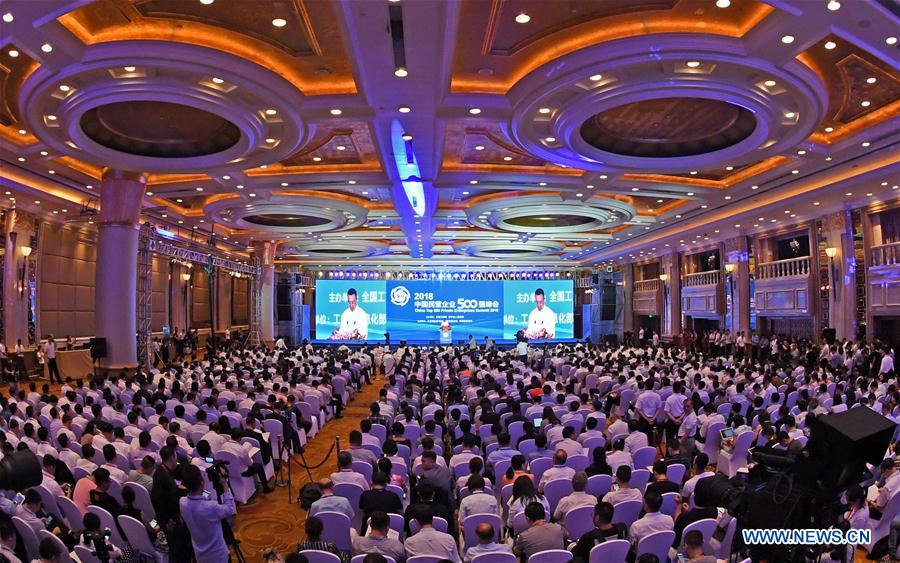China's private businesses gain momentum amid challenges
China's private businesses have gained momentum in 2017, adding to positive signs of an economy that pushes forward high-quality growth.
China's private businesses have gained momentum in 2017, adding to positive signs of an economy that pushes forward high-quality growth.
The 2018 Summit of China Top 500 Private Enterprises is held in Shenyang, the capital of northeast China's Liaoning Province, Aug. 29, 2018. [Photo/Xinhua]
China on Wednesday unveiled its latest ranking for top 500 private enterprises, with telecom equipment giant Huawei and e-commerce firm Suning atop the list amid sound development of the country's private business.
The list by the All-China Federation of Industry and Commerce (ACFIC) came at the 2018 Summit of China Top 500 Private Enterprises held in Shenyang, the capital of northeast China's Liaoning Province.
Revenues of the nine largest private firms all exceeded 300 billion yuan (44 billion U.S. dollars) in 2017. The top companies include Huawei, Suning, Amer International, JD.com, Weiqiao Pioneering Group, Legend Holdings, Evergrande, and Gome Holdings.
Of the top 500 private companies, 61 firms saw their total assets surpass 100 billion yuan last year, 11 more than in 2016.
To be listed as China's top 500 private companies last year, an enterprise need to have its revenues exceeding 15.68 billion yuan.
According to ACFIC vice chairman Huang Rong, the list came out of more than 4,600 Chinese private firms which voluntarily participated in an ACFIC survey. Not all big private enterprises are covered.
Since reform and opening up in the late 1970s, private businesses have assumed a bigger role in driving growth. The sector now contributes more than 60 percent of China's GDP growth and provides over 80 percent of jobs.
"The development of private investment and businesses are key to China's economic vitality. Changes on the 500 top private firms list show new trends in the country's economy," said Zhang Wanqiang, an economist with Liaoning Provincial Academy of Social Sciences.
The trends, observed by Hu Biliang, an economist with Beijing Normal University, include industrial structure optimization, fewer irrational outbound investment and more research and development (R&D) input.
"China's private businesses continued to take on a sound development momentum in 2017," Huang said, adding the private companies have steadily optimized its industrial structure with greater contribution to society.
Last year, 162 private firms in the service sector were on the list, up 38.46 percent compared with the figure in 2012. Meanwhile, the number of firms in the secondary industry fell in the fifth consecutive year from 380 in 2012 to 333 in 2017.
The number of export-oriented firms on the list declined from 259 in 2016 to 230 last year. The total exports of the top 500 private enterprises dropped by 16.28 percent year on year to around 125.2 billion U.S. dollars in 2017.
"The number of overseas investment projects for top 500 private firms has declined in 2017, for the first time in over the past five years," said Wang Zhile, head of Beijing New Century Academy on Transnational Corporations.
"The decline is a result of the government's strengthened efforts to curb irrational outbound investment and companies' more prudent attitude toward overseas projects," said Hu.
The trends are in line with China's massive transformation toward quality development, which is to turn the Chinese economy, once heavily reliant on fixed-asset investment and exports, into a service and consumption-led growth pattern.
Nonetheless, more Chinese private companies started investing in countries and regions along the Belt and Road last year, which fuelled export growth.
"Thanks to the Belt and Road Initiative, around 47 percent of our sales volume came from overseas markets last year. The initiative offers us a good platform to go global. I believe that TCL's growth in overseas markets will continue outpacing that in the domestic market in the future," said Li Dongsheng, chairman of Chinese home appliance giant TCL.
Another trend lies in R&D input increase. R&D workers in 189 private firms on Wednesday's list account for over 10 percent of their total business employment, compared with 12 companies in 2016.
They play a vital role in creating new ideas and technologies that keep companies competitive, create new markets and spur economic growth. "Leading companies have realized the importance of R&D input for firms," said Huang.
Zhang Jin, board chairman of Cedar Holdings Group, said that nation and company alike, their development will be limited if they lack independent innovation.
At the end of 2017, there were 65.79 million individually-owned businesses and 27.26 million private enterprises in China, which employed some 340 million people.
China's private investment grew 6 percent year on year, 2.8 percentage points higher than a year earlier, to 38.2 trillion yuan last year, according to official data.
But in recent years, activities in the private sector have become less vibrant due to economic headwinds, higher labor and material costs, entry restrictions and financing difficulties.
The trend has alarmed authorities, prompting the implementation of further measures to stimulate activities, such as streamlining investment project approvals for private investors, lowering the threshold for private firms to enter key areas, and making financing more accessible and affordable.
"Aimless and speculative enterprises will not live long. Most of the 500 top private firms thrive in the real economy, engaging in a specific field for decades," said Zhang Jindong, chairman of Chinese electronics retailer Suning Holdings Group, adding that a down-to-earth approach is the secret for a successful company.


